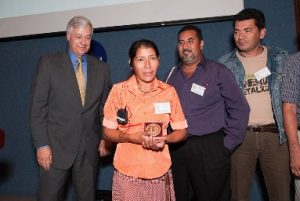Sister Cities
Mining in the News in Madison and Maine
Scroll down to read:
Bangor Daily News: Irving Addresses Maine Mining Interests at UMFK Forum
Madison Times: Salvadoran Mining Struggles are Pertinent to Wisconsin
April 25, 2012
by A. David Dahmer
The recent mining controversy in northern Wisconsin was far more complex than people would have you believe, says Jan Morrill as she stopped in Madison as part of a national tour she was embarking on. Morrill, who works for the National Roundtable Against Metallic Mining, is actively working to build international alliances on the issue of mining.
Morrill spoke from her own extensive experience on building U.S.-El Salvador ties in a talk called “Globalizing Mining Resistance” April 11 at Helen C. White Hall on the University of Wisconsin-Madison campus.
Morrill has been directly working with communities resisting mining in El Salvador for four years and is currently the representative of the International Allies against Metallic Mining in El Salvador, a coalition of organizations in the U.S. and Canada working to support the struggles of Salvadoran communities for sovereignty over their natural resources. In her work, she coordinates closely with the National Roundtable against Metallic Mining, national organizations in El Salvador, and the communities that have been and would be directly affected by gold mining.
“I've been talking about patterns in the international mining industry and how what happened here in Wisconsin is not unique to here,” she tells The Madison Times in an interview at Ground Zero Coffee shop. “That's what has been happening in El Salvador, Honduras, Guatemala, and South America, the Philippines.”
 Mining companies have come to communities in El Salvador, and now in Wisconsin, touting jobs and "environmentally safe mining" which uses, they claim, new technology and new techniques. But what they say is very different from what Morrill says she has seen firsthand.
Mining companies have come to communities in El Salvador, and now in Wisconsin, touting jobs and "environmentally safe mining" which uses, they claim, new technology and new techniques. But what they say is very different from what Morrill says she has seen firsthand.
“The only real way people have been able to protect their natural resources right now has been to push back against those mining companies and to organize themselves to get information to the decision makers who are deciding on the case,” Morrill says. “That's how the tribes in northern Wisconsin were able to align themselves with environmentalists and people concerned about water here in the southern part of the state and push back against legislatures. That's what is happening in El Salvador.”
The rural communities in El Salvador have formed a national coalition with environmental non-governmental organizations (NGOs), churches, health NGOs, and lawyers against mining companies that have been coming in. “They've been successful,” Morrill says. “There's a moratorium on mining right now.”
The key industry in El Salvador is gold mining and the big corporations are looking to do open-pit cyanide leach gold mining. “It's a process that mixes water, gold, and cyanide together to separate the gold from the soil,” Morrill says. “Obviously, that is really environmentally destructive and it has caused a lot of problems in Honduras and Guatemala and Mexico, so the Salvadoran communities where gold mining was being proposed have done a lot of research and work to find out the dangerous effects of that.”
Morrill has some success stories to share. One of the communities she works with is the site of a gold mine owned by a Milwaukee company, The Commerce Group. San Sebastian is now suffering serious environmental and health consequences as a result of the gold mining process.
Read the rest of the article here>>
Bangor Daily News: Irving Addresses Maine Mining Interests at UMFK Forum
May 03, 2012
by Julia Bayly
FORT KENT, Maine — Mining in Aroostook County will not come at the expense of the environment, regardless of the economic potential, the head of the Canadian-based company that owns Bald Mountain pledged Thursday morning. James Irving, president of J.D. Irving Ltd. addressed his company’s plans to mine Bald Mountain in central Aroostook County during a forum sponsored by the University of Maine at Fort Kent’s board of visitors.
“We have a long-term investment in this state,” Irving told about 350 people attending the forum in UMFK’s Fox Auditorium. “We don’t want some mining operation screwing that up.” Irving, whose St. John, New Brunswick, company has been involved in Maine forest and timber production since the late 1800s, said his primary goal in exploring mining options on Irving-owned land in Maine is determining whether there is the possibility for economic benefit. But he stressed it will not come at a cost to the environment.
“Whatever we do it has to be done right,” Irving said. “We have no interest in a project that will damage our reputation or the environment.” Irving added he and his company “take great pride in how we manage our timberlands in Maine and if the mining can’t be done right, we’ll stick to planting trees.”
J.D. Irving Ltd. currently owns 1.25 million acres of timberland in Maine, primarily in Aroostook County. It owns the 500 acres on Bald Mountain 15 miles west of Portage in partnership with Aroostook Timberlands, LLC. Last month Gov. Paul LePage signed into law LD 1853 which streamlined Maine’s mining permitting and regulatory process and, according to its sponsors Rep. John Martin, D-Eagle Lake, and Sen. Troy Jackson, D-Allagash, will make mining areas like Bald Mountain more economically attractive for landowners.
The legislation was drafted at Irving’s request.
“We approached John [Martin] and Troy [Jackson] because they have done a great job over the years fighting for northern Maine,” Irving said. “The big reason for the changes in the law was the regulations for mining in Maine were outdated,” Irving said. “We saw they could be changed to make Maine more competitive on the global market.”
See previous coverage of the Maine law on the Sister Cities website>>
Read more April and May Anti-Mining News on Stopesmining.org>>



-300x225.jpg)